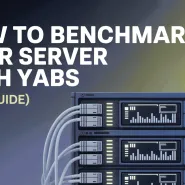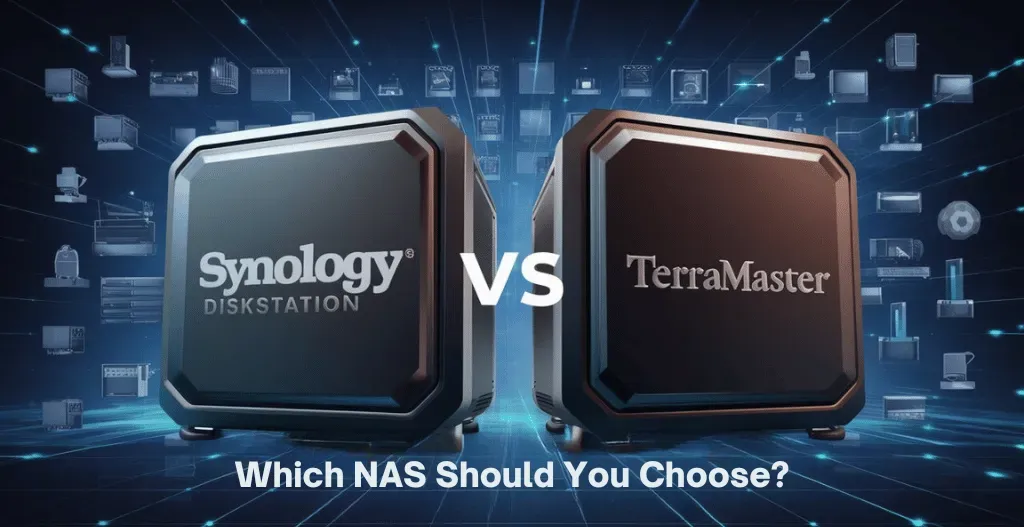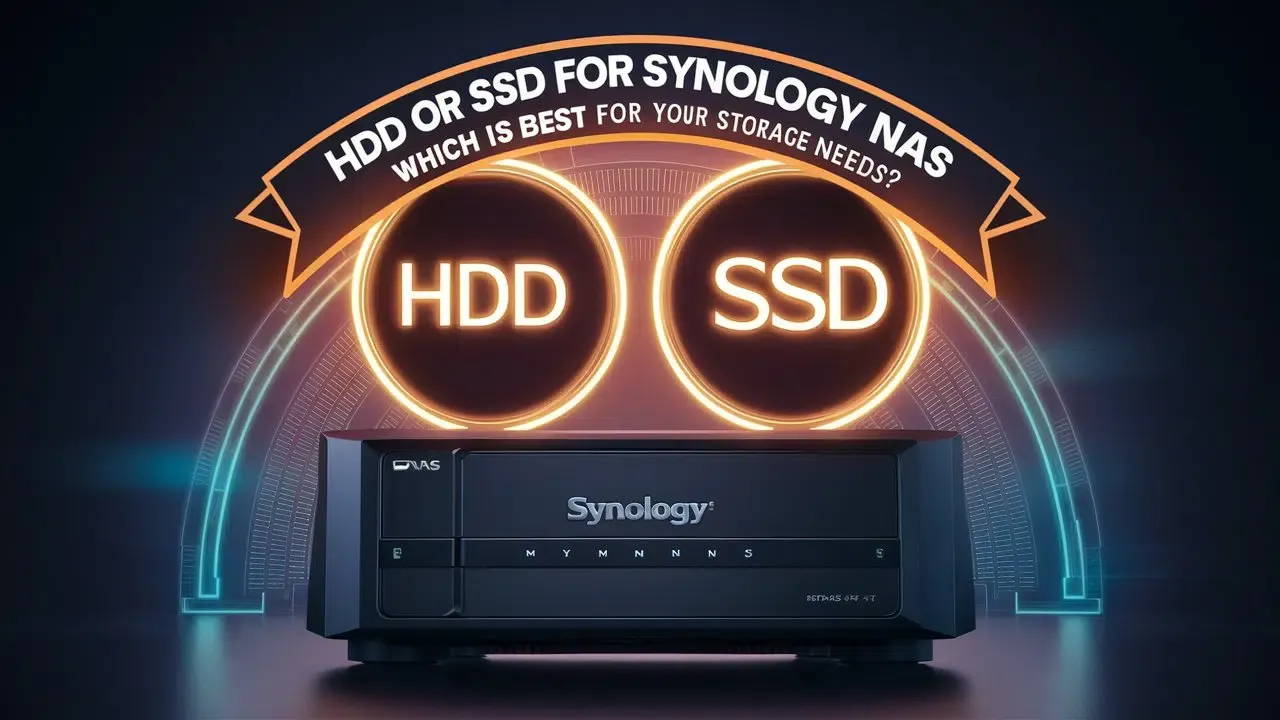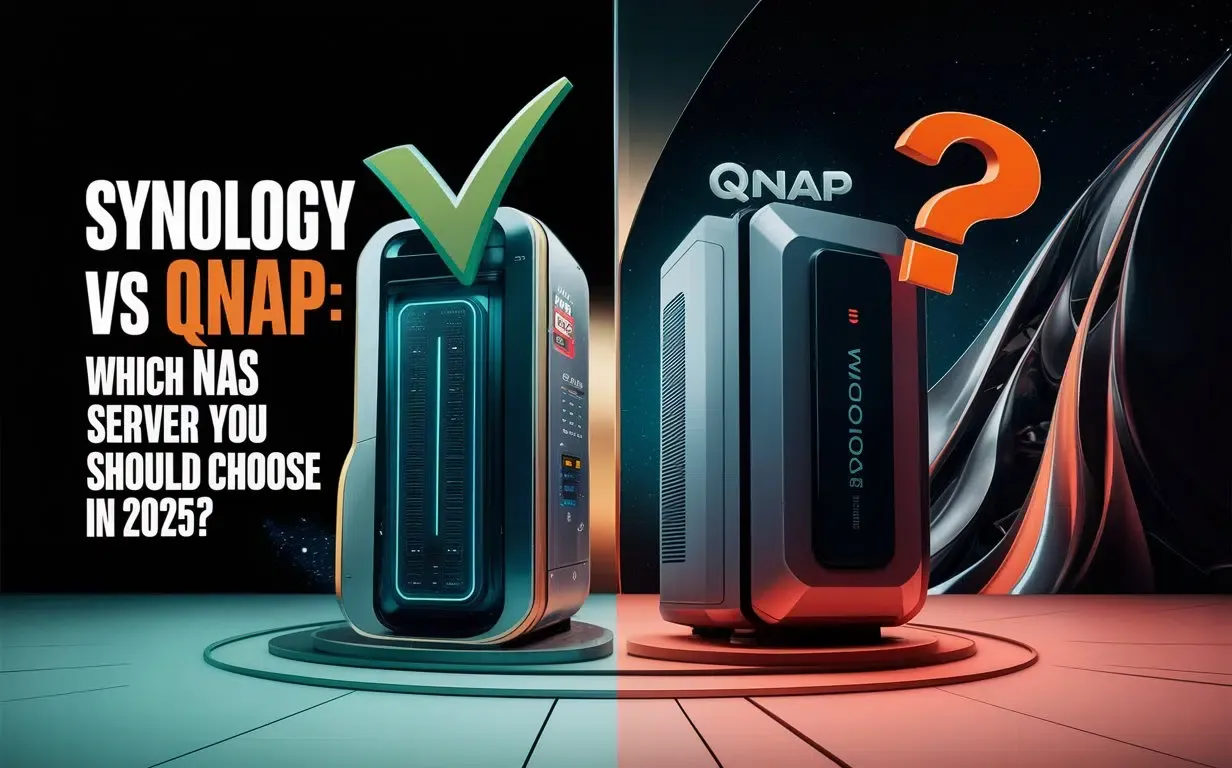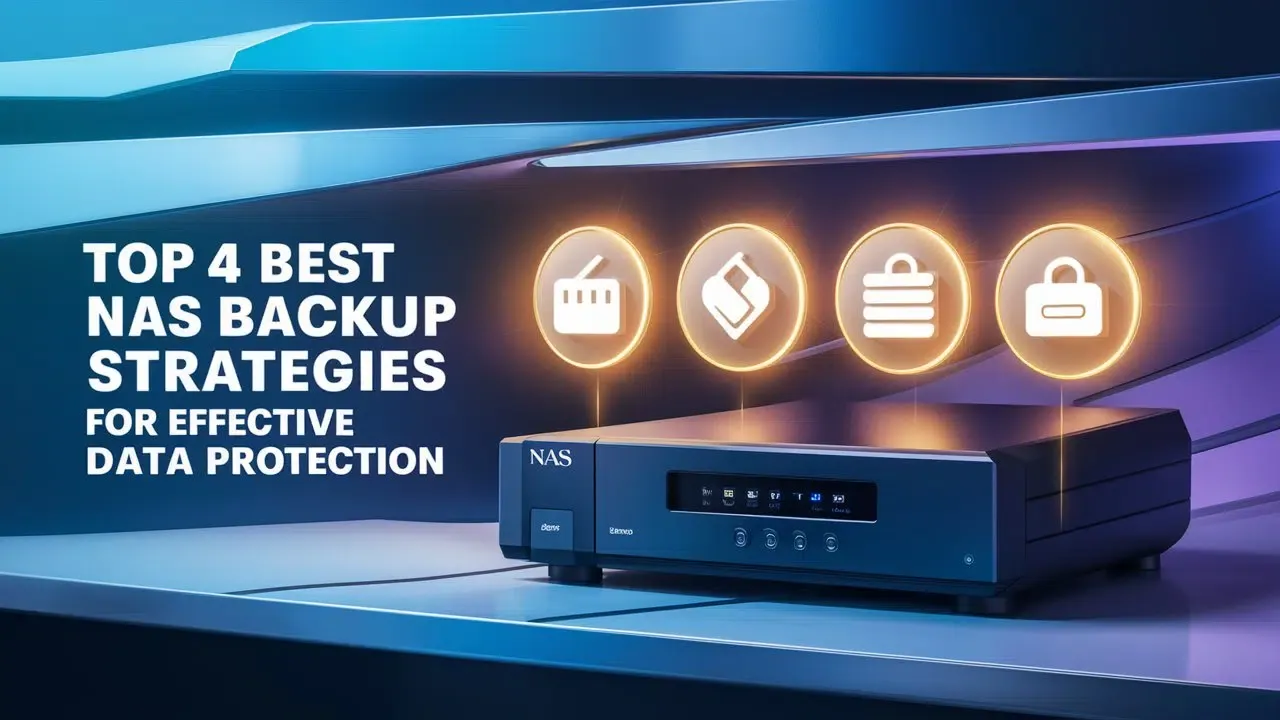Synology and TerraMaster are two well-known names in the world of network-attached storage (NAS), drawing attention from both home users and businesses. With the growing need for reliable data storage in today’s digital age, selecting the right NAS solution has become increasingly important. Whether you need a media server, a secure backup system, or a collaborative workspace, the choice of NAS can greatly influence your productivity and data management.
In this guide by Owrbit, we’ll compare Synology DiskStation and TerraMaster devices, focusing on their features, performance, ease of use, and value for money. Synology is often praised for its intuitive operating system and diverse app ecosystem, while TerraMaster stands out for its competitive pricing and solid performance.
This comparison will highlight the strengths and weaknesses of both brands, helping you decide which one aligns best with your storage needs and budget. Whether you’re a tech enthusiast or a beginner, this guide will give you the insights you need to make an informed decision for your home or business NAS solution.

What is Network-Attached Storage (NAS)?
Network-Attached Storage (NAS) is a centralized storage platform that enables multiple users and devices to access and share data stored in storage over the network. This type of storage is typically equipped with their own operating system (NAS OS) and can also function as a dedicated NAS server. Different type of NAS servers provide different results, and it is essential to choose the best NAS for your specific needs.

Popular NAS vendors such as Synology, QNAP, Asustor. They all offer’s a wide range of NAS products mentioned in today’s market. When it comes to choosing the best home NAS, many users choose Synology NAS for its user-friendly interface and robust features. Others may opt for Qnap or Asustor depending on their specific requirements. Users can also buy budget NAS brands like D-Link if cost comes into play.
Whether you are a home user or a professional, selecting the right NAS system is crucial for seamless data management and accessibility.
Benefits Of Network-Attached Storage :
Network-Attached Storage (NAS) offers several benefits for both home use and businesses purposes.
- Unlike other expensive servers that are designed to communicate with other servers or computers without human intervention, NAS devices provide a simpler and cost-effective solution.
- By using a NAS platform, you can easily store your data and make it accessible to all connected devices in your network.
- Among the many NAS brands available, Synology, QNAP, Asustor stand out for their robust performance and user-friendly features.
When you buying the right NAS device, understanding their differences can greatly improve your storage efficiency and user experience.
Synology vs TerraMaster : Which NAS Storage is Best

Overview to Synology :
Synology Inc. is a Taiwanese company that specializes in designing the network-attached storage (NAS) devices. They are founded in the year 2000. Synology uses a rich operating system called DiskStation Manager (DSM), which provides a friendly interface for users and a range suite of applications for data management, backup, restore, storing, and multimedia purposes. Synology NAS devices can be used for personal, business or enterprise for storage solutions. They also offers features like protection of data through advanced security.

Benefits Of Synology NAS Devices :
Synology has built a strong reputation for its user-friendly interface, high performance, and extensive software ecosystem. Here are some of the key benefits of Synology:
- User-Friendly Interface : Synology’s uses DiskStation Manager (DSM) that is one of the most intuitive and easy-to-use NAS operating systems on the market. DSM offers a smooth user experience, even for those who are not used any NAS device earlier.
- Software Ecosystem : DSM comes with a rich range of applications, including Synology Drive, Synology Moments, and Synology Office, which transforms the NAS device into a multi-functional device for file management, photo organization, and office productivity.
- Data Protection : Synology offers advanced data protection features such as RAID configurations, snapshot technology, and backup solutions. The Hyper Backup tool allows for multi-version backups to various destinations, including public clouds.
- Security Feature : With features like 2-factor authentication, firewall, and antivirus, Synology ensures that your data is well-protected against unauthorized access and cyber threats.
- Scalability : Synology NAS devices are designed to grow according to your needs. Many models support expansion units, allowing you to increase your storage capacity without replacing your existing device.
Overview to TerraMaster :
TerraMaster is a brand known for providing affordable and reliable NAS (network-attached storage) solutions. These devices are great for both home users and small businesses that need a way to store and manage their data. TerraMaster focuses on giving users high-quality NAS systems at a lower price than some of the bigger brands, making it accessible to a wide range of people.
Their products range from basic models for personal use to more advanced systems that businesses can use for data storage, backups, and sharing files.

Key Benefits of TerraMaster :
- Affordable Prices
- Budget-Friendly: TerraMaster devices are cheaper than many other NAS brands, making them a great choice for people who need NAS functionality without spending too much.
- Good Value: Even with the lower price, TerraMaster devices still offer strong hardware and good features, such as fast processors and expandable storage.
- Good Performance
- Fast Speeds: TerraMaster NAS units offer quick data transfer, making it easy to move files or stream media.
- Media Streaming: Some TerraMaster models support video streaming directly from the NAS, which is great for watching movies or shows without buffering.
- Easy to Use
- Simple Interface: TerraMaster’s TOS operating system is easy to use, allowing you to manage files and backups without needing advanced technical skills.
- Quick Setup: Setting up a TerraMaster NAS is straightforward, so you can get it running without much hassle.
- Data Protection
- RAID Support: TerraMaster devices support RAID, which helps protect your data by saving copies across multiple drives, so you don’t lose files if one drive fails.
- Backup Tools: TerraMaster includes features to help you automatically back up important files, so your data is safe from loss or damage.
- Media and Home Use
- Media Server: You can use TerraMaster NAS as a media server to store and stream videos, music, and photos to your devices at home.
- Plex Compatibility: TerraMaster works with Plex, a popular media platform, so you can organize and stream your media from anywhere.
- Expandable Storage
- More Space: As your storage needs grow, you can add more drives to your TerraMaster NAS to increase space.
- Connect External Drives: Many models also allow you to connect external drives for faster file transfers or extra storage.
- Cloud Integration
- Sync with Cloud: TerraMaster works with cloud services like Google Drive and Dropbox, allowing you to sync your NAS with cloud storage for additional backups.
- Works Across Devices
- Cross-Platform: TerraMaster NAS can be used with Windows, macOS, and Linux, so you can access your files from different types of devices.
- Great for Small Businesses
- Collaboration Tools: TerraMaster is great for businesses that need remote access, file sharing, and other tools to help teams work together efficiently.
- Surveillance Support: You can also use TerraMaster to connect security cameras and monitor your property with their surveillance features.
Comparison of Key Factors Between Synology and TerraMaster :
1. Operating System :
- Synology:
- Uses DiskStation Manager (DSM), a super easy-to-use operating system. It feels like using a computer, with drag-and-drop features and a simple layout.
- Has a large app store with hundreds of apps for things like media streaming, file backup, and even running virtual machines.
- TerraMaster:
- Runs on TerraMaster Operating System (TOS), which is also easy to use but more basic than Synology’s DSM. It’s still good for everyday tasks like storing files and streaming media.
- The app store is smaller but covers essential functions like backups and media streaming.
2. User Interface & Ease of Use :
- Synology:
- Very beginner-friendly, with a clean and modern design that’s easy to navigate. It’s great for both new users and those who want more advanced features.
- TerraMaster:
- Also easy to use, but the design is simpler and less polished than Synology’s. It’s functional but doesn’t have as many advanced options.
3. Performance & Hardware :
- Synology:
- Known for strong performance, especially on high-end models that can handle complex tasks like running virtual machines or streaming 4K videos.
- TerraMaster:
- Provides good performance for the price. It’s great for everyday use, like file sharing and media streaming, and some models can even handle video streaming without lag.
4. App Ecosystem :
- Synology:
- Offers lots of apps for different needs, from media servers like Plex to business tools for backups, file sharing, and even virtual machines.
- TerraMaster:
- Has a smaller app store, but it still includes all the basic apps you need for backups, media streaming, and file management.
5. Data Protection & Backup Solutions :
- Synology:
- Provides excellent backup tools and options for securing your data, like RAID (which protects your files if a drive fails), encryption, and automatic backups.
- TerraMaster:
- Also offers RAID support and basic backup tools, but it’s more straightforward and doesn’t have as many advanced security features as Synology.
6. Multimedia & Media Server Capabilities :
- Synology:
- Great for media streaming, with the ability to handle 4K video and stream to multiple devices. Works well with Plex and other multimedia apps.
- TerraMaster:
- Also good for media streaming, though it’s more basic than Synology. Some models support 4K streaming, and it works with Plex too.
7. Cloud Integration :
- Synology:
- Syncs easily with cloud services like Google Drive, Dropbox, and OneDrive, making it simple to back up your data to the cloud.
- TerraMaster:
- Works with major cloud services too, but Synology has more options and smoother integration for syncing with the cloud.
8. Scalability & Expandability :
- Synology:
- Highly scalable, meaning you can easily add more storage or even expansion units to grow as your needs increase.
- TerraMaster:
- Also lets you expand storage by adding more drives or connecting external ones, but doesn’t offer as many expansion options as Synology.
9. Security :
- Synology:
- Offers strong security features, like two-factor authentication, encrypted folders, and regular security updates to keep your data safe.
- TerraMaster:
- Provides basic security, including encryption and RAID options, but doesn’t have as many advanced security features as Synology.
10. Price :
- Synology:
- Higher priced because it offers more advanced features, better performance, and a wider range of apps. It’s great if you need top-tier performance and don’t mind paying more.
- TerraMaster:
- More affordable and provides good performance for the price. It’s ideal for people who want a reliable NAS without spending too much.
Use Cases: Which NAS is Right for You? Synology vs TerraMaster
- Synology: Perfect for users who want an easy-to-use system with advanced features, strong security, and lots of app options. It’s a great long-term investment for both home users and businesses.
- TerraMaster: A great option for those looking for a budget-friendly NAS with solid performance for everyday tasks like backups, file sharing, and media streaming. Ideal for home users or small businesses that don’t need all the extra features Synology offers.
Frequently Asked Questions (FAQs) :
1. What is a NAS?
A NAS (Network-Attached Storage) is a device that connects to your network, allowing multiple users and devices to access and store data. It provides a centralized location for file storage, backup, and media streaming.
2. What are the main differences between Synology and TerraMaster?
Synology is known for its user-friendly interface, extensive app ecosystem, and advanced features, making it ideal for both home users and businesses. TerraMaster, on the other hand, offers budget-friendly options with solid performance for basic tasks, but with fewer advanced features and a smaller app library.
3. Which NAS is better for media streaming?
Synology is generally better for media streaming due to its superior transcoding capabilities, support for 4K video, and compatibility with popular apps like Plex. TerraMaster also supports media streaming but may not perform as well for demanding tasks.
4. Can I use a NAS for backups?
Yes, both Synology and TerraMaster NAS devices are excellent for backups. They offer features like RAID support, automated backup tools, and cloud synchronization to keep your data safe.
5. Can I access my NAS remotely?
Yes, both Synology and TerraMaster offer remote access features. With proper configuration, you can access your files and manage your NAS from anywhere using a web browser or mobile app.
6. Do I need technical skills to use a NAS?
While some basic technical knowledge can be helpful, both Synology and TerraMaster are designed for ease of use. Their user interfaces are intuitive, making them accessible for beginners and casual users.
7. Which NAS is better for businesses?
Synology is generally better suited for businesses due to its advanced collaboration tools, strong security features, and extensive app ecosystem. However, TerraMaster can be a good option for small businesses with simpler storage and sharing needs.
Conclusion :
Choosing the right NAS (Network-Attached Storage) device is crucial for efficiently managing your data, whether you’re a home user or running a small business. In this guide, we’ve compared Synology and TerraMaster, two popular brands in the NAS market.
Synology is known for its user-friendly interface, extensive features, and robust security options. It’s an excellent choice for those who want a powerful system for media streaming, backups, and collaboration. With a wide range of apps available and strong performance, Synology can handle demanding tasks and grow with your needs.
On the other hand, TerraMaster offers a more budget-friendly alternative. While it may not have as many advanced features, it still provides solid performance for everyday tasks like file storage, backups, and media streaming. It’s a great option for home users or small businesses looking for a reliable NAS without breaking the bank.
Ultimately, the choice between Synology and TerraMaster depends on your specific needs and budget. If you want a feature-rich NAS that offers great performance and scalability, Synology is the way to go. If you need a more affordable solution that still meets basic storage and sharing requirements, TerraMaster is a solid choice. Whatever your decision, both brands have their strengths and can help you manage your data effectively.
Discover more from Owrbit
Subscribe to get the latest posts sent to your email.

